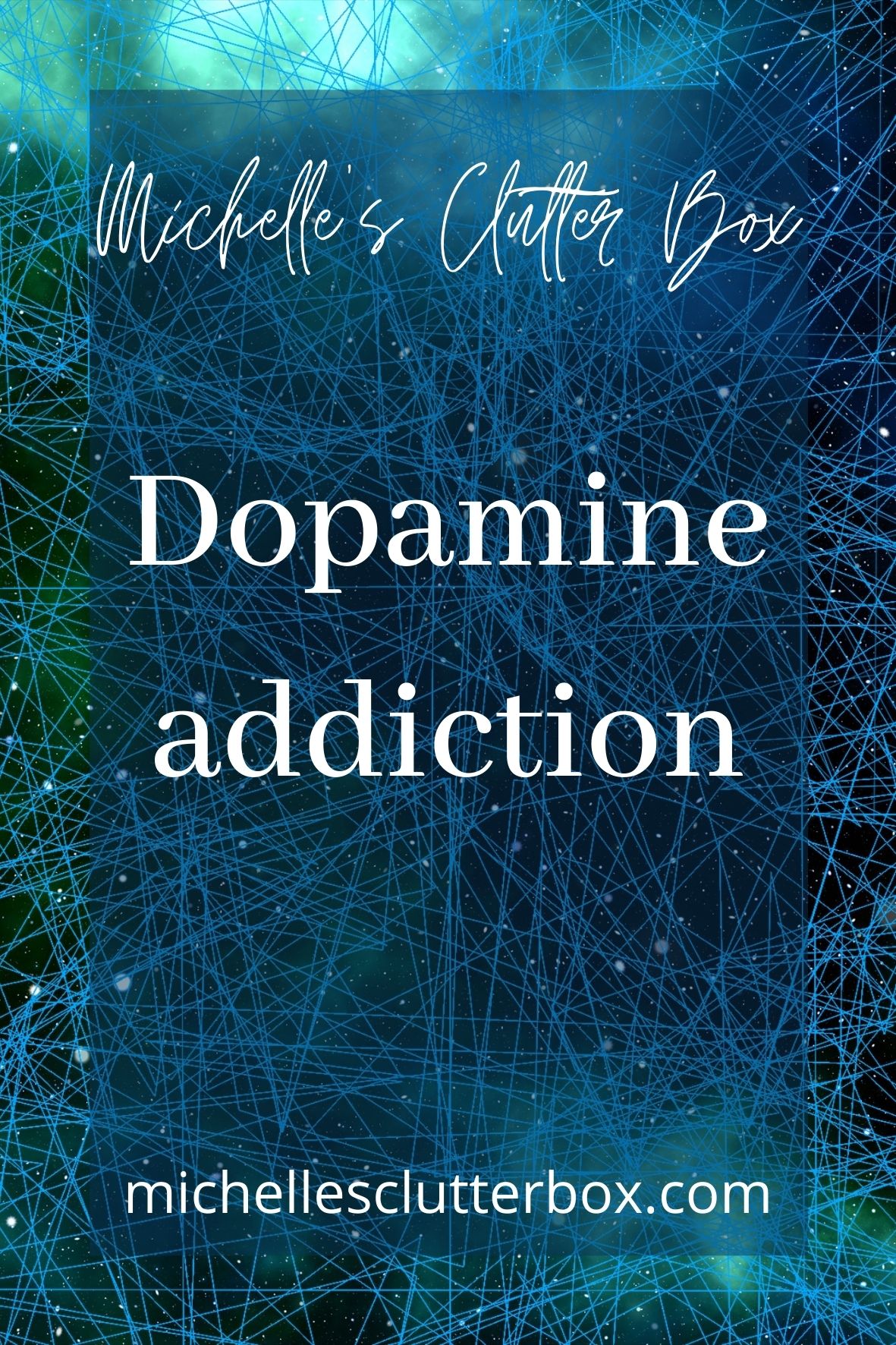Dopamine addiction

‘Dopamine addiction’ is a new buzzword I’ve been hearing. As you know, dopamine is commonly known as the pleasure chemical in the brain and is associated with pleasurable experiences. It’s getting a bad reputation as the cause of all the problems in the world, especially social problems. It’s also associated with addiction, hence ‘dopamine addiction’.1
I’m on the fence about this whole thing. Can you be addicted to a chemical that occurs naturally in the brain and that you can’t voluntarily release? Let’s delve into it.
The problem
Usually, when you read up on dopamine addiction, it will be in the context of the addiction to the internet, smartphones, social media, etc.
I think people can be (and are) addicted to their devices. I just have to think back to the students I had who couldn’t focus for longer than five minutes without reaching for their phones. But is that an addiction to the device or dopamine?
What is dopamine?
Your brain has a reward centre (or pleasure centre) and it activates when you do or experience something that feels good. Those pleasurable feelings release dopamine, a neurotransmitter.2 Your brain then focuses its attention on what the thing or experience is that made you feel good. It does this so that you have a good memory of that good feeling and what caused it. These memories and associations become stronger the more times your brain gets a reward from an experience (whatever it may be).2,3,4
Not only that, but your brain also wants to remember where it can find that feeling or sensation again. Thus, your brain wants to remember which kind of environment they can find it in again (time of day, plenty of people around, is it a noisy space, etc.). When you are in that environment again, you will have the craving to get that pleasant experience again. However, it does not have to be something harmful like drugs, it can even just be food or sex.1,2
The release of dopamine makes sense from an evolutionary standpoint. Our ancestors had to survive rough terrains and with scare resources. Thus, their brains had to remember where they got pleasurable experiences, like food and possible sexual partners, etc., because those things determined their survival and that of the species.5
Dopamine is wrongly called the ‘pleasure chemical’
Dopamine not directly responsible for pleasure. Yes, it contributes to the feeling, but it does not create those feelings. What it does is reinforce pleasurable behaviours by having your brain remember them so that it can get or experience them again – therefore it’s linked to addiction. To sum up, dopamine is more about motivation than pleasure.2,5,6
The neurotransmitters that cause pleasurable feelings (euphoria) are serotonin, endorphins, and oxytocin.1,2
Interestingly enough, dopamine levels also rise when one experiences something unpleasant. It can be when something you don’t expect or memorable happens. I’m guessing your body does this so that you can be more prepared for the ‘danger’ next time you are in the same environment.6,7
Dopamine has many other functions in the brain, and not just those associated with pleasure.1,5 As stated, it is a neurotransmitter, and it helps the brain to process information. We can describe it as a ‘switchboard’ in the brain and it influences how information is handled in different parts of the brain.5 Dopamine is present in both hemispheres of the brain. It affects not only your sense of pleasure but also your sleep, memory, attention levels, and motor skills and movement.6

The relation between dopamine and addiction?
People often link dopamine to addiction because it works in your brain’s pleasure centre. Your brain releases dopamine whenever it experiences something pleasurable so that it can be repeated, but it doesn’t differentiate if that behaviour or substance is good for you.2,5
As you will see, addiction is not as simple as just dopamine being released. It plays a role, but it’s complicated – as you’ll see in this section.2
We can better describe dopamine as a motivator and is not the cause of addictions. There are many things that influence and cause addiction, yes dopamine plays a role, but there is an array of factors.1,2,8 Things like your genes, medical history, and the age at which you started experimenting with drugs, domestic life, peer pressure, challenging upbringing, all play a role in addiction.2
Addiction is complex. It involves multiple chemicals, and it influences the communication between brain cells. You can’t say that addiction is actually just dopamine.3
Addiction causes changes in your brain, specifically to the cortex and limbic system, because of the substance or behaviour, even though at first it makes you feel pleasure.3,7 To emphasise, these changes are caused by various chemicals and not just dopamine.
How dopamine plays a role in addiction
There are specific triggers that come with addiction. These may be environmental or emotional triggers, that cause dopamine release, and may cause one to relapse and go back to their addiction.8 As stated if your brain recognises the environment where they usually get a pleasurable sensation, your brain releases dopamine. Thereafter, more dopamine is released with the actual experience. Over time, however, the brain has either less dopamine or fewer receptors.5
Dopamine plays a role in your body’s tolerance to drugs or behaviours. When you regularly use drugs, it can overstimulate the pleasure centre of the brain. Your brain then struggles to handle the high levels of dopamine. Your brain then tries to deal with this problem in one of two ways, it can either lower its dopamine production or reduce the number of dopamine receptors. Either way, you won’t get the same high that you used to because of this and your body’s tolerance of the drug builds up.2,5
You can’t be addicted to dopamine, but it plays a role because it motivates your brain to get those pleasurable feelings again. Thus, it is the drug or activity that you’re addicted to, not dopamine.2,8
Saying you’re addicted to dopamine is like saying love is just a chemical or that depression is just a chemical – it’s not. There are very physical attributes to these states of being and many causes.
Also, you can’t consciously release dopamine, it is the effect of something else – which can be drugs or certain behaviours.
Don’t tell people that their problem is dopamine because then they don’t take responsibility and change. You need to be aware of your behaviour to change it, and the reasons behind it so they can take control of their lives.1
Pop science/psychology
These days there is this thing called dopamine fasting. With dopamine fasting you would deprive yourself of any pleasure, whatever it may be, social media, food, sex, you name it. By doing this, people want to rewire or reset the pleasure system in their brains. Apparently, it helps them focus and be happier with simple things in life again.5
This fad of dopamine addiction and consequently dopamine fasting has let media outlets to oversimplify the function of dopamine in the body – some gave out information that was blatantly false.5
It seems like the major fault with ‘dopamine addiction’ and ‘dopamine fasting’ is the name thereof. Dopamine fasting is something that is used in addiction therapy (under medical supervision) and can help the patient immensely if they do it correctly.5
Dopamine fasting or detox is really about doing less of a toxic behaviour – like screen time and social media. If you refrain from drugs or bad behaviour, it’s not dopamine fasting, it’s just abstinence from the drug or toxic behaviour.5
You can’t actually have a dopamine fast because your body and brain can’t function normally without it.1,5 Also, low levels of dopamine are associated with mental health diseases like depression.8
Another thing, it’s unhealthy to avoid every pleasurable experience. You should rather focus on balance and identify any problematic behaviours or substances.5
If you are struggling with any kind of addiction, always seek professional help and get your support system on board with helping you to overcome the addiction.8
Social media addiction
Like I said earlier, I think people can be addicted to their devices and social media. Social media platforms especially are programmed in a way that keeps you there and people become addicted to it.4
Related post: How good or bad is technology for a child?
Social interactions are a cause of dopamine release. If you think of it in terms of evolution, it’s something that you want to be doing in order for the species to survive. It’s not the smartphone or device itself that is addictive, it’s what it offers. We as humans are programmed to be social, and that is what social media offers – the illusion of social interaction. You get likes and comments on your social media posts.4
Social media platforms want your time and attention because they make their money out of advertisements. The more time you spend on social media, the more likely you are to see the ads and to possibly buy products from it.4
Thus, to keep you on the platform, it uses social rewards. Social media is programmed in a way that it keeps you there and people become addicted to it. The likes and comments on these websites keep you engaged, and it keeps you checking your device.4 It’s a social reward because you get the validation that you’ve done something right, by posting a selfie or funny meme, etc.
In addition, you don’t know when the ‘reward’ or likes and comments are going to come through, so you check your phone frequently without really having a reason to do so.4
A real addiction
This device addiction has got so bad that it’s scary for some people to leave their devices alone. That is because then they can’t distract themselves from whatever is bothering them in their lives. You then have to confront yourself and be alone with your thoughts, and that can be quite unsettling for many people.4,5
Social media and the overusing of devices have been associated with anxiety, depression, and insomnia, so it’s very dangerous.4
If you’re addicted to the internet and social media you have to find out what causes the problem – low self-esteem or something like that? Then you have to find limits and use them in your everyday lives. Also, like with any addiction, avoid triggers for the addiction and learn how to deal with it if you are triggered.5
To treat it, you need to stay away from the internet and devices, like you would with any other drug.5 Again, seek professional help if you have access to it.
There are a few things you can do to limit your screen time. Firstly, you can disable the notifications to your social media accounts. Secondly, you can even set your smartphone to only display in black and white – it’s boring, so that might discourage you to look at your phone frequently. Thirdly, ask yourself why you’re picking up your device, are you bored, or is there a specific reason? That might also curb your cravings. Rather read a book or do something that interests you.4
My take away
First, dopamine is not addictive – substances and toxic behaviours can be addictive. There are many (neuro)chemical, environmental, and emotional factors at play with addiction.
It seems like we use dopamine as a scapegoat when people should actually look inward to how they can take control of the situation.
Addiction also has a social aspect, especially when you think of socially acceptable addictions like social media and alcohol addiction. Taking part in these behaviours makes you part of the group, and people want to fit in.
On social media, you hand out likes and comments and get validation when someone responds to your posts. Similarly, by bragging how wasted you were or how hungover you are, you may also conform to the conventions of that group. This reminds me of how people said ‘A weekend’s not wasted when you’re getting wasted’ at university. It’s not cool, it’s sad.
What do you think about dopamine addiction? Let me know in the comments.
Michelle
P.S. If you’d like to contact me, feel free to comment below, send an email to thatmichelleperson@gmail.com, or follow me on Twitter @M_ClutterBox.
I used these sources:
- https://www.psychologytoday.com/za/blog/women-who-stray/201701/no-dopamine-is-not-addictive
- https://www.healthline.com/health/dopamine-addiction
- https://www.news-medical.net/health/Addiction-and-Dopamine.aspx
- http://sitn.hms.harvard.edu/flash/2018/dopamine-smartphones-battle-time/
- https://www.livescience.com/is-there-science-behind-dopamine-fasting-trend.html
- https://www.thetemper.com/dopamine-addction-recovery/
- https://www.discovermagazine.com/mind/resetting-the-addictive-brain
- https://www.betterhelp.com/advice/medication/dopamine-addiction-what-is-it-and-how-to-overcome-it/










Richard
A very solid post, Michelle. I’ll admit, I found myself ‘addicted’ to social media for a while. I was constantly checking notification and likes and felt myself getting depressed when I wasn’t seeing the responses I wanted. Luckily, I was able to move past that I use social media as a tool now instead of a crutch for my self-esteem.
Thanks for sharing your insight on this.
RB
Queenie
I haven’t read something as informative as this post about dopamine! A nice read to start my morning 😉
That Michelle Person
Thank you so much for reading! 🙂
Jennifer Marston
This was a really interesting post! I’ve never heard of the phrase dopamine addiction before and actually learned quite a lot about dopamine from this too!
That Michelle Person
I’m so glad to hear that! Thanks for reading 🙂
mia
This is so so interesting! I was one of the people you mentioned in that i totally thought dopamine was addictive and that it caused the pleasure response in our brains! Really informative stuff, I’m going to do some more reading around it! xx
mia // https://beautiful-inspiring-creative-life.com/
That Michelle Person
I’m so happy that you enjoyed it! And thanks for reading 🙂